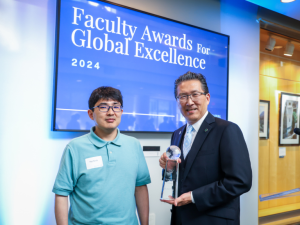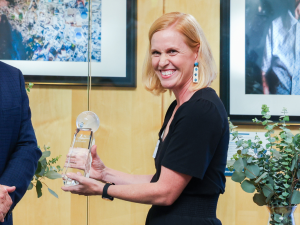PROVOST, VICE PROVOST PRESENT 2024 FACULTY AWARDS FOR GLOBAL EXCELLENCE
On May 1, at the FedEx Global Education Center, a group of faculty, staff, alumni and families joined together to celebrate a trio of UNC-Chapel Hill faculty members who received the Faculty Awards for Global Excellence, bestowed by the Office of the Vice Provost for Global Affairs (OVPGA).
This article was originally published on May 8, 2024, by Michele Lynn at UNC Global Affairs and can be found here.
In her opening remarks, Barbara Stephenson, vice provost for global affairs and chief global officer at Carolina, emphasized the commitment shared by her office and the University to advance and enhance Carolina’s global mission. She commended the awardees for embodying the potential, the promise and the possibilities of UNC-Chapel Hill’s commitment to excellence in global education, global research and global partnerships.
Provost Christopher Clemens presented each of the awardees — selected among more than 50 nominations — with their trophy. In his remarks, Clemens thanked faculty for integrating global content into the curriculum and engaging with partners worldwide to advance Carolina’s academic excellence and reputation.
“These global partnerships are deepened by peer-to-peer relationships that are developed by faculty,” he said. “Thanks to these opportunities, our graduates will be able to lead and address complicated global challenges, working across disciplines and across the globe.”
After the ceremony concluded, guests — including past winners of the award — continued to celebrate together. In the coming year, the OVPGA will continue to strengthen Carolina’s global reach, building on momentum from recently earning the North Carolina Association of International Educators’ 2024 Institutional Award and the Institute of International Education (IIE)’s 2024 IIE Heiskell Award for Global Partnerships, which honored Carolina’s partnership with Eberhard Karls Universität Tübingen, its strategic partner in Germany.
Read about this year’s winners below.
 Courtney Rivard, assistant professor in the department of English and comparative literature, assistant professor in the UNC School of Data Science and Society and director of the Digital Literacy and Communications Lab
Courtney Rivard, assistant professor in the department of English and comparative literature, assistant professor in the UNC School of Data Science and Society and director of the Digital Literacy and Communications Lab
As the director of the digital literacy and communications lab, Courtney Rivard sits at the border of digital humanities, data science and the traditional humanities. This enables her to consider a variety of perspectives and puts her in dialogue with people from diverse locations and disciplines.
“That allows me to see the connections between people that they might not see,” she said. “I see it as my greatest gift that I get to tie the strings together and help other faculty who are interested in developing international partnerships.”
Rivard has been a leader in creating collaborations to enhance the lives and studies of both Carolina students and students around the world. In 2021, she received an OVPGA Global Partnership Award for a program she developed with faculty at Tübingen. This work has evolved into the establishment of a medical humanities working group between Tübingen and Carolina that is exploring how centering stories can bring attention to people with eating disorders and help patients access care.
“Only by comparing problems in more than one country can we really seek to understand an issue because everything is interconnected in our global world today,” she said.
Similarly, Rivard — in collaboration with a faculty member at King’s College London — developed a COIL course on game theory and design. COIL, or Collaborative Online International Learning, links professors and students in different countries for collaborative projects and discussions as part of their coursework. Rivard and colleagues at King’s will co-sponsor a symposium on “Games Studies and Ludic Teaching” this summer in London. She says the symposium will be an exceptional opportunity for graduate students and faculty to make connections and exchange ideas.
“Sharing resources and strengthening ties help us understand how different people teach in different spaces and meet the needs of different students,” she said. “I bring new ideas back to my classroom which benefits my students.”
Koji Sode, William R. Kenan Jr. Distinguished Professor in the joint department of biomedical engineering between UNC-Chapel Hill and North Carolina State University 
Koji Sode begins every presentation to colleagues in his native Japan by helping them locate North Carolina on a map. Sode brings more than 30 years of experience in academia in Japan to the Carolina faculty, which he joined in 2018, and sees himself as a bridge between Japan and the U.S. in both science and research communication. He believes international collaboration is key to expanding both his research capability and research opportunities for his peers, students and partners. Doing so improves their ability to help patients.
He has created an extensive pipeline of Carolina students who study in the labs of Tokyo University of Agriculture and Technology, where he holds a faculty appointment, and he has started working closely with Nagoya University and Waseda University, too. He welcomes students from those universities to his lab in North Carolina. Sode says being in the Tar Heel State has expanded his reach.
“I tell my former students in Japan, ‘I’m not leaving you; I’m connecting you,’” he said.
Last year, he participated in a UNC delegation visit to Japan, where he introduced his colleagues to representatives in government, academia and his favorite ramen restaurant.
“[North Carolina provides] a fantastic research environment because it is cooperative: no walls between departments and no walls between the universities since my department is a joint department working together with UNC-Chapel Hill and NC State,” he said.
Thanks to Sode’s commitment and vision, that spirit of cooperation continues to grow between UNC-Chapel Hill and Japan.
 Erinn Whitaker, professor of the practice in the curriculum in peace, war and defense
Erinn Whitaker, professor of the practice in the curriculum in peace, war and defense
As a professor of the practice, Erinn Whitaker uses her extensive experience in national security to help her undergraduate students gain real-world skills. Although intelligence sources and methods remain classified, Whitaker is able to share her knowledge in classroom lectures and individual conversations. By creating simulations in her classes, particularly in partnership with the Diplomacy Initiative, Whitaker offers her students the opportunity to participate in experiences such as a mock National Security Council meeting in the aftermath of the terrorist attacks on the U.S. on September 11.
“Even if students decide that they don’t want to be a policymaker, they understand what the national security architecture looks like by trying it out themselves,” she said. “Bringing this approach of hands-on learning makes it more tangible for students.”
She also brings practitioners to campus to speak to her classes and encourages students to attend guest lectures on campus, so that students can hear from people who are currently working in national security. As the faculty advisor for the student-led Women in National Security (WINS), Whitaker supports group members interested in careers in intelligence. Her efforts extend beyond campus as she is the primary investigator for both the Women in Cybersecurity exchange program with Nagoya University in Japan and the Women in Global Security exchange program with the University of Helsinki in Finland.
Whitaker, who loves the intellectual curiosity and humility of Carolina students, works to help her students gain a stronger sense of their own interests and passions and an understanding of how to apply that to national security. She says that the Faculty Award for Global Excellence speaks to the importance that UNC-Chapel Hill places on learning not just on campus, but globally. It’s a challenge she plans to continue to accept.



